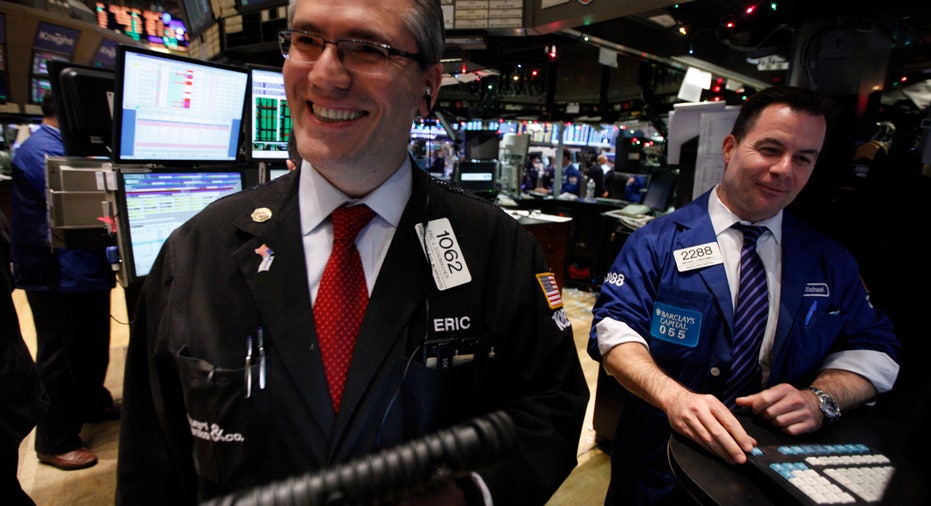Rebound Rally: Data, Greek Optimism Shoot Stocks Higher

FOX Business: The Power to Prosper
The markets charged higher on Thursday on the heels of the worst session of the year for the Dow as traders cheered upbeat data on the U.S. economy and encouraging headlines from Europe.
Today's Markets
The Dow Jones Industrial Average rose 123 points, or 0.96%, to 12904, the S&P 500 climbed 14.8 points, or 1.1%, to 1358 and the Nasdaq Composite gained 44 points, or 1.5%, to 2960.
On a broad level, materials, financial, energy and technology companies performed the best. Indeed, looking at a cross-section of the Dow, both Microsoft (NASDAQ:MSFT) and Bank of America (NYSE:BAC) soared 4%. DuPont (NYSE:DD), Hewlett-Packard (NYSE:HPQ) and American Express (NYSE:AXP) all jumped more than 2%.
Europe Stays in Focus
Market participants are still closely eyeing developments out of Europe. European Union officials once again pushed back their decision on Greece's $169 billion bailout until Monday at the earliest. However, Reuters reported in the late morning that they may move to approve the bailout on Monday. Additionally, a separate report from Reuters said the European Central Bank plans on exchanging its Greek bonds this weekend as part of a plan to help the country lessen its debt load.
The embattled country has a debt payment coming up on March 20, which it won't be able to make without the first tranche of rescue aid. A default of Greek debt, analysts have said, could imperil financial markets across the continent.
Eurozone blue chips slipped 0.45%, shedding much heavier losses, as tracked by the Euro Stoxx 50 index. Meanwhile, the euro turned course and climbed 0.09% to $1.3078. The dollar was down 0.15% against a basket of six world currencies as tracked by the dollar index.
Data Deluge
Traders also parsed through a slew of data on the U.S. economy.
New claims for unemployment benefits fell to 348,000 last week -- the lowest level since early March 2008 -- from an upwardly revised 361,000 the week prior. Economists had expected claims to rise to 365,000 from an initial reading of 358,000. The four-week moving average, which is seen as a less volatile reading, fell to its lowest level since April 2008.
The labor market has been showing significant signs of improvement recently. Indeed, the unemployment rate fell to 8.3%, its lowest level since February 2009 in January.
Manufacturing in the mid-Atlantic region picked up steam in early February. The Philadelphia Federal Reserve's manufacturing gauge jumped to 10.2 for the month from 7.3 in January. Economists expected a reading of 9.5.
Like the jobs market, manufacturing has also rebounded considerably in recent months, with regional and national indices moving on an upward trajectory.
Housing starts rose 1.5% in January to a 699,0000-unit rate, topping estimates of a 675,000-unit rate. Permits to build new homes rose 0.7% to a 676,000-unit rate, slightly less than the 680,000-unit rate expected.
The Producer Price Index climbed 0.1% in January from December, a smaller rise than the 0.4% economists expected. Excluding the food and energy components, prices rose 0.4%, quicker than the 0.2% forecast.
On the corporate front, General Motors (NYSE:GM) posted a fourth-quarter profit of 39 cents a share, excluding items, on sales of $38 billion. Analysts expected the automaker to earn 41 cents on $38.21 billion. Coca-Cola (NYSE:KO) boosted its dividend by 8.5% to 51 cents from 47 cents per common share.
Commodities markets were mostly higher, shedding earlier losses.
The benchmark crude oil contract traded in New York rose 50 cents, or 0.49%, to $102.64 a barrel. Wholesale RBOB gasoline climbed 1.3% to $3.05 a gallon.
Gold ticked higher by 30 cents, or 0.02%, to $1,728 a troy ounce.
Foreign Markets
Eurozone blue chips slid 0.45%, the English FTSE 100 dropped 0.26% to 5,876 and the German DAX slipped 0.4% to 6,731.
In Asia, the Japanese Nikkei 225 edged lower by 0.24% to 9,238 and the Chinese Hang Seng fell 0.41% to 21,277.



















